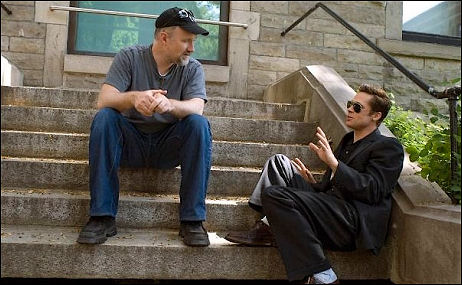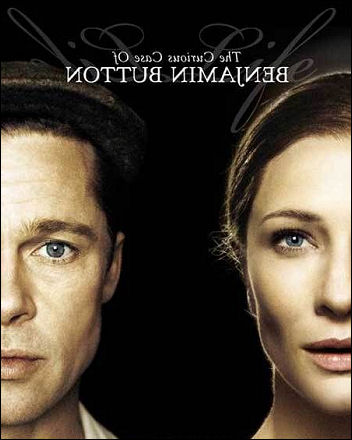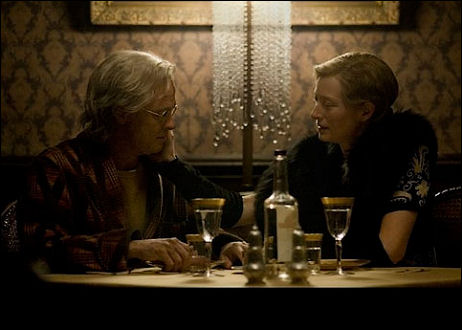Well, it was enough for me in a cinefile-ish, film-magic appreciation sense, but I can’t say that David Fincher‘s sublime and poignant new film truly — what is the phrase? — “reached inside and stirred the depths of my soul.” I will certainly see it again, but I can’t say I’m as hungry for a second immersion into this gently emotional death-trip movie, this dreamy-sad glide through time and memory and the textures and aromas of 20th Century America, as I was when I first saw Fincher’s Zodiac some seventeen or eighteen months ago.

Zodiac is a legendary art film — a deeper, fuller thing every time I re-view it because of how it never tries to overtly persuade its audience that it’s anything more than a whipsmart policier about a legendary cold case. Because the theme of obsession is simultaneously dramatized and embodied by the obsessive nature of the film itself. Because it’s settled and confident in its own skin and lets the story tell itself while Fincher, remarkably, builds it into something more than the sum of its parts.
The Curious Case of Benjamin Button, on the other hand, feels very caught up from the start in its attempts to mesmerize and create a burnished good-old-days atmosphere. And it works like a champ in this respect. I’ll never forget the ripe vibe this movie casts. And yet I’m not sure if I really know what it’s saying, or it’s really “saying” anything other than that life is an adventure to be savored and lived to the fullest. That’s a good thing to express in any fashion or medium, but I was saying to myself as I watched it unfold, “Yeah, yeah, I agree, yes….and?”
The basic idea behind the original F. Scott Fitzgerald story basically says that the best part of life comes at the beginning and the worst part at the end, and what would a man feel and learn if the journey was reversed?
Like Forrest Gump, which was authored by Button screenwriter Eric Roth, Fincher’s langorous tale is about a passive, good-natured fellow — Brad Pitt‘s Benjamin Button — who lives a kind of charmed (and at the same time somewhat cursed) life that’s rooted in New Orleans but involves much travel, traverses decades and nurses a lifelong, never-waning love for a beautiful spirited woman — Cate Blanchett‘s Daisy.

It starts with old-baby Pitt — a withered, carcassy, white-haired infant — being born in World War I-era New Orleans, and then watches him de-age and gain strength, enjoying the lusciousness of living more and more, as he moves through the ’20s and ’30s and into World War II as an old and then a middle-aged man. And then gradually as a progressively younger and hunkier guy who looks cool and likes to ride a motorcycle and whose blissful sensual peak comes at the height of youth and vigor in his early 40s, 30s and 20s, which manifest 40, 50 and 60 years after his old-man birth (and happily coincides with Blanchett’s normal-progression trajectory). And then he’s a teenager, a kid, a toddler and a baby.
The renderings of Pitt’s and Blanchett’s various age-states are just about perfect. Face-pasting, makeup, prosthetics, digital-wrinkle removing — all or most of it as exquisite as the wizardry of new and emerging digital technology can miraculously provide.
But you get used to all this. Pitt’s reverse-aging is endlessly absorbing, but it loses its wow-ness after a while, and once it levels off you’re basically left with a story about a guy just living a life. And like I said earlier this morning, his journey has little in the way of story tension and the rooting interest isn’t really there because all he’s trying to do is be with the love of his life, Daisy. Well, that happens finally when they’re both young and close in age. But then time pulls them apart, and then they’re together again and true-heart Daisy becomes his care-giver when he can no longer fend for himself.
Like I said earlier, it’s not that you don’t care for Pitt’s Button but he’s a watcher, an observer, an eternal quiet man. He’s there to absorb and experience and love and savor, but he’s nothing like a take-charge doer with any kind of primal goal or need. We’re talking decades here, and the movie is basically a Gump thing — a leisurely cruise on a slow riverboat down a pastoral but mostly rapid-free river. Many intense and eye-filling things happen. The randomness of life, the give-and-take, the eternals all bleed into the whole. But the story is basically a journey of chapters — this happens, that happens, shit happens.

Brad Pitt, Tilda Swinton
Button is filled, yes,with all kinds of touching meditations and observational riches and a constant awareness of the here-today, gone-tomorrow thing. It is a moving film to sit through, but it provides only as much warmth and emotionalism as director David Fincher and screenwriter Eric Roth felt was right and true and appropriate.
Benjamin Button is a dream — rapturous, essential, eternal filmmaking. And with a heart that is kindly, charitable, gentle, open. It’s beautiful, it’s unique, it’s bold…and I’m not at all sure that it’s going to reign supreme as a Best Picture candidate. Nor am I persuaded that it’s going to make any kind of real money. It’s a fascinating, very brave and half-wonderful film, but it’ll be a real challenge selling it to the stooges out there, particularly the under-30s.
I agree with Variety‘s Anne Thompson that it’s “an historic achievement, a masterful piece of cinema, and a moving treatise on death, loss, loneliness and love” and that “it may pack a more powerful punch the older you are and the more people you have lost.” But it doesn’t feel like a Best Picture slam-dunker for reasons stated above and before.













